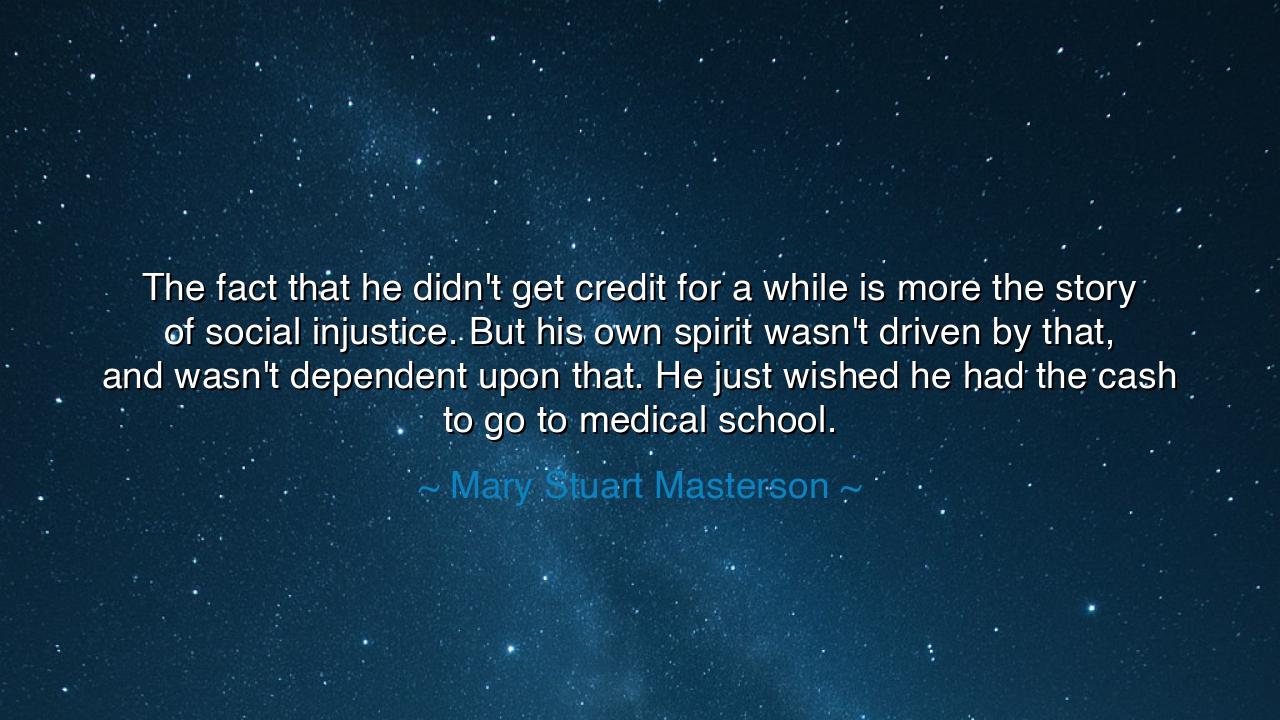
The fact that he didn't get credit for a while is more the story
The fact that he didn't get credit for a while is more the story of social injustice. But his own spirit wasn't driven by that, and wasn't dependent upon that. He just wished he had the cash to go to medical school.






In the gentle yet profound words of Mary Stuart Masterson, there rings a truth both sorrowful and inspiring: “The fact that he didn’t get credit for a while is more the story of social injustice. But his own spirit wasn’t driven by that, and wasn’t dependent upon that. He just wished he had the cash to go to medical school.” These words, though spoken of one man’s life, carry within them the story of countless souls — men and women whose genius bloomed unseen, whose greatness went unrewarded, yet who labored on with grace and humility. In her reflection, Masterson captures the eternal conflict between injustice and integrity, between the world’s neglect and the individual’s unwavering spirit.
The meaning of this quote lies in the distinction between recognition and purpose. The man of whom Masterson speaks — the brilliant Vivien Thomas, the pioneering surgical technician who helped revolutionize heart surgery — lived in an age when color barred him from the honors his work deserved. Though his mind and skill guided some of the greatest medical advances of his time, society refused to acknowledge him. Yet, as Masterson reminds us, his spirit was not ruled by bitterness. His work was not a plea for applause, but a devotion to knowledge, to healing, to the craft itself. In his heart burned not the desire for fame, but the simple, noble wish to learn and to serve. His disappointment was not for lack of glory, but for the denied chance to study formally, to become the doctor he longed to be.
The origin of Masterson’s words comes from her portrayal of Vivien Thomas’s story in the film Something the Lord Made, which tells of the partnership between Thomas and the renowned surgeon Dr. Alfred Blalock at Johns Hopkins. Together, they pioneered techniques that would save the lives of countless children suffering from congenital heart defects. Yet for decades, only Blalock’s name appeared on the research; Thomas, a Black man in pre-civil rights America, was seen merely as an assistant, not the mind and hands behind the innovation. Masterson’s reflection on this injustice pierces deeply: she does not romanticize his struggle, but honors the purity of his dedication. She points out that, despite the cruelty of circumstance, his heart remained steadfast — his worth was never diminished by the blindness of others.
In this, Thomas’s story mirrors the wisdom of the ancients, who taught that true virtue is measured not by reward, but by resolve. The philosopher Epictetus, himself born into slavery, once said, “It is not what happens to you, but how you react to it that matters.” Like Thomas, he knew that dignity lies within the soul, untouched by worldly injustice. The Stoics called this the strength of character — to live rightly, even when the world is wrong. In every age, the just and the gifted have suffered neglect: Hypatia, the philosopher of Alexandria, slain for her learning; Van Gogh, who painted brilliance into eternity yet died poor and uncelebrated; Vivien Thomas, who built the foundations of modern surgery without ever holding a medical degree. And yet, their greatness endures — because it was not dependent upon recognition, but upon truth and devotion.
There is an emotional power in Masterson’s words that transcends time. She reminds us that injustice may silence the songs of the worthy, but it cannot still their music. Vivien Thomas wished not for fame, but for opportunity — for the means to learn, to formalize what his gifted hands already knew. And yet, in the absence of that opportunity, he forged his own path, proving that the spirit of learning and creation cannot be bound by walls of prejudice or poverty. His story is both tragic and triumphant — tragic in its reflection of the world’s blindness, triumphant in its display of human endurance.
Let us then take from this the lesson that recognition is fleeting, but integrity eternal. The world may fail to see our worth, but that blindness cannot diminish the value of our work or the nobility of our labor. True greatness does not depend on applause; it depends on purpose. The wise and the good must learn, as Thomas did, to find fulfillment not in the world’s praise, but in the quiet certainty of having done their work well. Let your spirit not be driven by reward, nor broken by denial. Serve your calling faithfully — for the justice of history is slow, but sure.
And finally, let us remember what Masterson’s words truly honor: the unconquerable spirit — that sacred flame which no injustice can extinguish. Vivien Thomas lived without the credit he deserved, yet his work illuminated the world. His humility was his crown, his perseverance his monument. From him we learn that even when the world withholds its due, one’s purpose remains divine. So live not for applause, but for truth. Work not for recognition, but for mastery. For the heart that seeks only to serve will, in time, outshine every injustice — and its light, like that of Thomas himself, will burn on through the ages.






AAdministratorAdministrator
Welcome, honored guests. Please leave a comment, we will respond soon